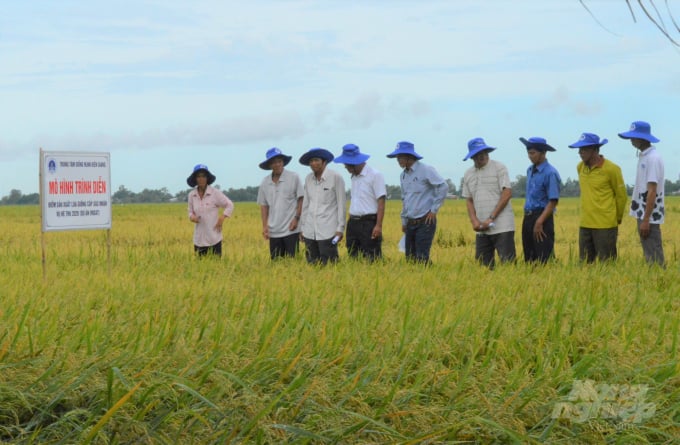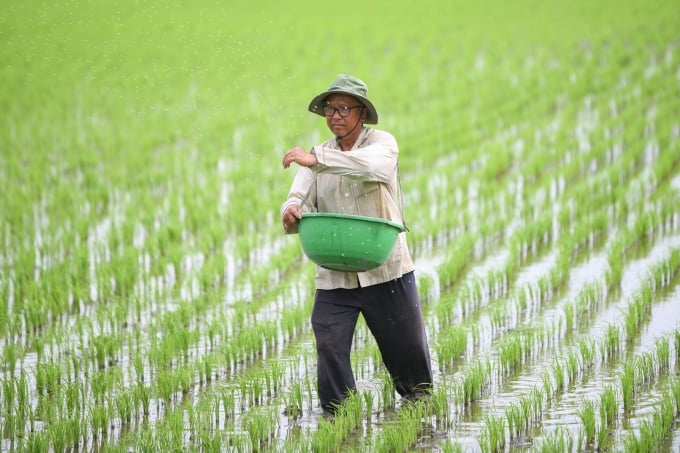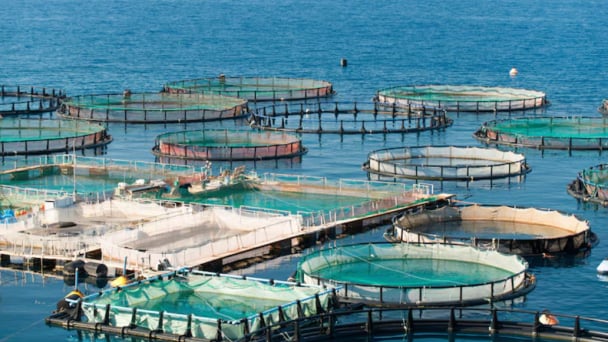June 4, 2025 | 17:09 GMT +7
June 4, 2025 | 17:09 GMT +7
Hotline: 0913.378.918
June 4, 2025 | 17:09 GMT +7
Hotline: 0913.378.918

With the support of the VnSAT Project, many farmer organizations have become typical cooperative economic models in the Mekong Delta. Photo: Trung Chanh.
The VnSAT project has positively impacted farming methods, changing farming practices by using quality rice seed in farmer cooperatives/organizations. Many farmer organizations/cooperatives have become typical cooperative economic models in the Mekong Delta.
Participating in the VnSAT project, members of Thanh Phat Cooperative (Thanh Yen A commune, U Minh Thuong district, Kien Giang province) have reduced the amount of seed rice in many recent rice crops, sowing sparsely, applying the measure "3 decreases, 3 increases", "1 must, 5 decreases", integrated pest management in the field, helping rice achieve high yield, at a reasonable cost.
Mr. Tran Van Danh, manager of Thanh Phat Cooperative, said that the unit currently has 81 cooperative members, cultivating an area of 222.5 hectares, producing two crops per year. Thanks to the training and proficient use of advanced rice farming techniques of the VnSAT project, farmers have reduced production costs by reducing the amount of seed sown, nitrogen fertilizers, and pesticides, irrigation water volume.
Mr. Nguyen Van Den, in charge of the business of Kim Cuong Kien Giang Co., Ltd., said that the company's main activities in 2 fields are trading in rice and seafood. The company's material area investment covers most of the critical rice production districts of the province, such as An Bien, An Minh, U Minh Thuong, Vinh Thuan, Hon Dat, Kien Luong, Tan Hiep.
"To develop a stable and sustainable rice material area, we have linked rice cultivation with many farmer organizations, including cooperatives participating in the VnSAT project, such as Thanh Phat Cooperative (U Minh Thuong district).
To farmers, Kim Cuong Kien Giang Co., Ltd. has provided all input materials, including rice seeds, fertilizers, and pesticides. At the same time, the company signed a contract to cover all commercial rice for the cooperative members at the market price. Therefore, farmers do not have to worry about investment costs; assured about the output", Mr. Den shared.

Farmers are increasingly saving on fertilizer costs when participating in the VnSAT project. Photo: Trung Chanh.
After more than six years of implementation (including an extension of 18 months, until June 2022), the VnSAT project has supported a large-scale program on improved farming and agronomic management to promote sustainable rice production in many provinces and cities in the Mekong Delta.
Specifically, the project supported establishing or consolidating 318 farmer organizations/agricultural cooperatives operating in the rice field, creating sustainable rice growing linkages. Along with that, training for about 142,500 farmers on the technique of "3 decreases, 3 increases" and nearly 89,000 farmers about "1 must, 5 decreases".
With the support from the VnSAT project, the provinces have implemented the construction of infrastructure works and essential production equipment. The project's support contributes to promoting development, improving the operational efficiency of agricultural cooperatives, linking rice cultivation and sustainable rice business.
The area of sustainable rice cultivation through advanced techniques in the project area reaches about 150,000 hectares, and about 40% of this area has rice-growing contracts with enterprises participating in the project.
Many cooperatives have improved their capacity in Hau Giang province by participating in the VnSAT project. Mr. Tran Trung Kien, Director of Phuoc Loc Agricultural Cooperative (Truong Long A commune, Chau Thanh A district, Hau Giang province), said that the cooperative was established in 2015 coinciding with the time when the VnSAT project started to develop in the Mekong Delta. Cooperative leaders and cooperative members can participate in training courses to improve production and management skills, helping to improve operational capacity.
According to Mr. Kien, Phuoc Loc cooperative has been invested in a warehouse to store rice and a rice drying oven on an area of 3,000 m2, with a total cost of up to VND 7.9 billion. Without the support of the VnSAT project, the cooperative could not have enough capital to invest.

Due to the VnSAT project's investment in infrastructure and drying kilns, farmers have been more active in harvesting and consuming. Photo: Trung Chanh.
Now, Phuoc Loc cooperative has mechanized from tillage, pumping irrigation to harvesting, providing input materials, rice seeds... Particularly for commodity rice consumption and the area of cooperative members, The unit also buys for other cooperatives in the area.
"As a collaborative economy, again participating in the value chain in the VnSAT project on rice production, buying and selling together, so it is beneficial to negotiate prices. In the case that when the harvest is a lot, but the price of rice drops too deeply, it is not good for consumption, the cooperative will meet the members, agree to store rice, wait for a better price so as not to affect the profit. But in the past, after harvesting, they had to sell, even at a loss, because there was no kiln or storage, so they had to bear it," Mr. Kien said proudly about the cooperative's capacity.
Mr. Nguyen Van Sang, a Phuoc Loc Agricultural Cooperative member, has nearly 5 hectares of rice. The VnSAT project has helped his family give up traditional and ineffective farming practices. Thanks to participating in the VnSAT project, he was trained in new farming techniques. He was also supported with both materials and methods and participated in practice.
Sowing sparsely with sufficient density reduces costs, but rice has few pests and diseases. The rice is good in season, the seeds are very bright and firm, and it is safe because it does not have to spray so many chemicals. The cooperative also has policies to support its members, such as reducing the price of input materials, reducing the price of land preparation, watering, and harvesting... a lot of benefits.
Mr. Vo Minh Phuc, Deputy Director of the VnSAT project in Hau Giang province, assessed that the project has contributed to the transformation of sustainable rice production by solving the weak stages of agriculture. Specifically, the project helps to improve production and processing infrastructure and the operation of the value chain, creating great added value for partners in the chain, helping to develop more sustainably.
The institutional and policy reforms and the sustainable development foundation for the rice and coffee value chains created by the VnSAT project will serve as the foundation for Vietnam to replicate and restructure the rice and coffee value chains of the entire agricultural sector.
Translated by Ha Phuc

(VAN) Technology is redrawing the map of Vietnamese aquaculture: more modern, greener, and more sustainable.

(VAN) Novel process harnesses machine learning to reveal groups of genes that determine how efficiently plants use nitrogen.

(VAN) Several scientists and farmers are experimenting with soil treatment in some key durian-growing regions such as Cai Lay (Tien Giang), Dak Song, Gia Nghia, and Dak R’lap (Dak Nong).
/2025/05/25/4127-3-073637_820.jpg)
(VAN) Thanks to the promotion from an FAO-implemented project, vegetable production in greenhouses in Moc Chau has seen strong development, from 1.5 hectares in 2021 to nearly 50 hectares in 2024.

(VAN) FAO has recently supported USD 140,000 to implement the project 'Risk mitigation human-animal interface risks through disease control initiatives in pig farming.'

(VAN) The People's Committee of Tra Vinh province has approved an adjustment to the investment policy for the Green Hydrogen Plant project, increasing its area to approximately 52.76 hectares.
![Reducing emissions from rice fields: [2] Farmers’ commitment to the soil](https://t.ex-cdn.com/nongnghiepmoitruong.vn/608w/files/news/2025/05/05/dsc08881jpg-nongnghiep-140632.jpg)
(VAN) Clean rice cultivation model in Thuong Tan commune, Bac Tan Uyen district, is assisting local residents in achieving sustainable agriculture by substantially reducing costs, increasing productivity, and protecting the environment.